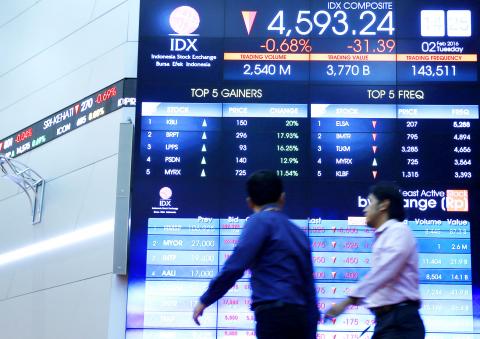Indonesia’s benchmark stock index rallied to a six-month high and the rupiah rebounded after the nation’s economic growth beat analyst estimates, as the government stepped up measures to boost state spending and lure foreign investment.
The Jakarta Composite Index rose 2.3 percent to 4,774.68 at the midday break, set for the highest close since Aug. 6 last year, as PT Bank Mandiri, the largest lender by assets, paced gains.
The rupiah reversed earlier losses. The yield on government bonds due September 2026 fell seven basis points to 8.04 percent, the lowest level since May last year, according to Inter Dealer Market Association.

Photo: Reuters
Indonesia’s GDP grew 5.04 percent in the final three months of last year, a government report showed yesterday, exceeding all estimates in a Bloomberg News survey, as Indonesian President Joko Widodo accelerated efforts to revitalize Southeast Asia’s biggest economy.
Consumer stocks, banks and builders would spearhead more gains in the nation’s benchmark stock index, the best performer in Asia so far this year, as they benefit from economic expansion, according to a report by PT Mandiri Manajemen Investasi.
“Consumer and infrastructure-related stocks will lead the rally this year. They will come ahead of banks and property stocks, which will benefit from falling interest rates,” Mandiri Manajemen chief investment officer Priyo Santoso said by telephone from Jakarta. “The numbers confirmed our earlier optimism on the economic recovery. Under an optimistic scenario, the Jakarta Composite could gain to 5,200 or 5,300 this year.”
Policymakers cut interest rates last month for the first time in 11 months, and have signaled further easing is possible this year.
Since taking office in October 2014, the president, known as Jokowi, has sought to boost foreign investment, infrastructure spending and implement bureaucratic reforms to rejuvenate an economy hit by sliding commodity prices.
Government spending rose 7.3 percent in the fourth quarter from a year earlier and surged 41.3 percent from the previous three months. Investment rose 6.9 percent year-on-year.
Bank Mandiri shares jumped 6.5 percent to lead a gauge of finance stocks to the highest level since August last year and the biggest gainer among nine industry groups. PT Telekomunikasi Indonesia shares rose 4.6 percent.
Better-than-expected growth in the economy could provide stability for the rupiah and provide more room for Bank Indonesia to cut interest rates further, PT Ciptadana Sekuritas analyst Syaiful Adrian said by telephone.
The economic recovery might also help reduce bad debt problems in the banking industry, he added.

Taiwanese suppliers to Taiwan Semiconductor Manufacturing Co. (TSMC, 台積電) are expected to follow the contract chipmaker’s step to invest in the US, but their relocation may be seven to eight years away, Minister of Economic Affairs J.W. Kuo (郭智輝) said yesterday. When asked by opposition Chinese Nationalist Party (KMT) Legislator Niu Hsu-ting (牛煦庭) in the legislature about growing concerns that TSMC’s huge investments in the US will prompt its suppliers to follow suit, Kuo said based on the chipmaker’s current limited production volume, it is unlikely to lead its supply chain to go there for now. “Unless TSMC completes its planned six

Intel Corp has named Tasha Chuang (莊蓓瑜) to lead Intel Taiwan in a bid to reinforce relations between the company and its Taiwanese partners. The appointment of Chuang as general manager for Intel Taiwan takes effect on Thursday, the firm said in a statement yesterday. Chuang is to lead her team in Taiwan to pursue product development and sales growth in an effort to reinforce the company’s ties with its partners and clients, Intel said. Chuang was previously in charge of managing Intel’s ties with leading Taiwanese PC brand Asustek Computer Inc (華碩), which included helping Asustek strengthen its global businesses, the company

Power supply and electronic components maker Delta Electronics Inc (台達電) yesterday said second-quarter revenue is expected to surpass the first quarter, which rose 30 percent year-on-year to NT$118.92 billion (US$3.71 billion). Revenue this quarter is likely to grow, as US clients have front-loaded orders ahead of US President Donald Trump’s planned tariffs on Taiwanese goods, Delta chairman Ping Cheng (鄭平) said at an earnings conference in Taipei, referring to the 90-day pause in tariff implementation Trump announced on April 9. While situations in the third and fourth quarters remain unclear, “We will not halt our long-term deployments and do not plan to

The New Taiwan dollar and Taiwanese stocks surged on signs that trade tensions between the world’s top two economies might start easing and as US tech earnings boosted the outlook of the nation’s semiconductor exports. The NT dollar strengthened as much as 3.8 percent versus the US dollar to 30.815, the biggest intraday gain since January 2011, closing at NT$31.064. The benchmark TAIEX jumped 2.73 percent to outperform the region’s equity gauges. Outlook for global trade improved after China said it is assessing possible trade talks with the US, providing a boost for the nation’s currency and shares. As the NT dollar